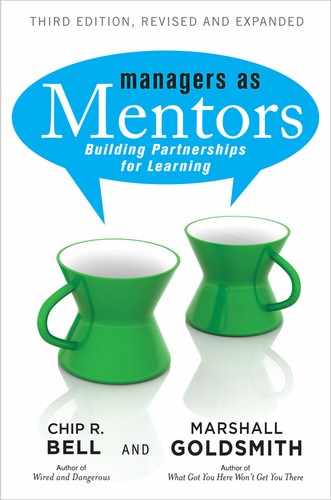Support Without Rescuing
The morning the baby bluebird took that first clumsy flight from the birdhouse to the nearest bush, both parents were on hand for the occasion, proud and no doubt anxious. As the wobbly fledgling took a short, awkward burst of flight, one parent was in the tree nearby, providing comforting chirps of encouragement.
Suddenly, the family black cat Taco (Bell) came around the corner. Instantly, one of the parents flew within a few feet of Taco, distracting her long enough for the young bird to reach a limb safely out of reach. It was a beautiful display of courageous selflessness by the parent, vital and well-timed support—but the student pilot was still left to do his own flying.
Mentors provide support and encouragement as protégés work to transform shaky new skills into confident mastery. The challenges for all mentors are “When does too much support become rescuing?” and “When does too little support become a sign of callousness?” Most mentors are tempted to take help to the level of interference. Too often we say, “Let me just show you how to do that!” when we should be asking, “What do you think you should do next?”
Mentor Scale and Balance
The Mentor Scale can be helpful in examining the issue of balance. Below are a few cautions based on your score on the Mentor Scale.
Sociability
Low: You may have a propensity to leave the protégé feeling abandoned. Provide more attention. Don’t be so quick to mentor and run. Demonstrate your interest in and concern for your protégé.
High: You may have a tendency to smother the protégé by overassisting. Remember that too much help can be as great a liability as too little. Back off a bit and give the protégé a wonderful opportunity: the chance to fail, and thus to learn.
Dominance
Low: You may leave the protégé feeling betrayed. When he gets no guidance at all, the protégé can feel alone and anxious—especially early in the relationship. Let self-direction happen, but don’t abdicate. Hang in there with the learner until you conclude he has wings strong enough to fly on his own.
High: You may have an inclination to rescue. Remember that growth comes through discovery and insight. Too much control can deprive the learner of the opportunity to find them on his own. Let go of the reins and give your protégé a bit more slack.
Openness
Low: You may cause the protégé to feel anxious, particularly early in the relationship. Guarded behavior begets guarded behavior. Remember, your timidity, caution, and reserve will only amplify similar feelings in the protégé. Take interpersonal risks, lighten up, and communicate your feelings. It will help break the ice and relax your protégé.
High: When you are too open too soon, you can make the protégé feel apprehensive. You set a standard that learners may think they are incapable of or unwilling to model and match. Openness and vulnerability are positive attributes in a mentoring relationship. However, too much too soon can be overwhelming.
The following assemble-it-yourself statement may help you find the right balance between helpful support and unhelpful rescue:
If I were really honest with myself, I would say I tend to offer help because
• I don’t want to see the protégé repeat mistakes I’ve made.
• I can’t afford too many errors in the name of learning.
• I don’t want to see the protégé hurt, embarrassed, disappointed, or discouraged.
• I need to show the protégé how competent I am.
• If I don’t show the protégé how, he’ll never learn or become competent.
If there is one lesson the bluebirds can offer, it is the living illustration of the teacher’s courage to let the learner fail. Mentors, like parents, want learning to be painless, but most significant growth happens through the discomfort of grappling for skill. En route to walking and running, knees get skinned. The bluebird dived courageously at the menacing cat as the student pilot fluttered awkwardly down the backyard runway. The parent seemed to be protecting its youngster—and more: demonstrating bravery for it. Learners dare to risk when they see the teacher take risks.
